
What is Multithreading?
Multithreading is when a program or operating system is able to organize multiple ..." />
What is Multithreading?
Multithreading is when a program or operating system is able to organize multiple ..."/>


What is Multithreading?
Multithreading is when a program or operating system is able to organize multiple requests by a single user without generating multiple copies of running program. Every program or system service request by user is tracked as a thread having separated identity. The track of status of every thread is kept until the task as per initial request is completed. For example, if you are making a drawing, multithreading would mean that the application is able to recognize each stroke separately till the drawing is completed and saved. So, we can say that multithreading is multitasking through threads, where every thread is a separate task being performed simultaneously.
Multithreading in Java
Java is a programming language used for developing software for different platforms. It is the first language to introduce multithreading. It allows two or more parts of a program to be executed concurrently for maximum utility of CPU. Java conducts multithreading by step-by-step starting a thread, making it runnable, running or executing the thread, waiting for concurrent threads to be performed while syncing to them and terminating it once the process is complete. This is just a brief introduction to what multithreading in Java is.
Multithreading in Java is used by web developers, application designers, game developers and animators. Enhanced performance and simplified coding makes Java multithreading a highly demanded skill across various industries. These skills can be gained by learning multithreading in Java. To read more about multithreading in Java and learn it online, click here.
About the Author: Writer, poet and artist Bhumika Gupta has been awarded with a National Certificate for her writings and is working as a Senior Content Writer at Multisoft. She is keenly interested in the training sector and has been passionately writing about corporate training courses since many years.
| Start Date | Time (IST) | Day | |||
|---|---|---|---|---|---|
| 05 Jul 2025 | 06:00 PM - 10:00 AM | Sat, Sun | |||
| 06 Jul 2025 | 06:00 PM - 10:00 AM | Sat, Sun | |||
| 12 Jul 2025 | 06:00 PM - 10:00 AM | Sat, Sun | |||
| 13 Jul 2025 | 06:00 PM - 10:00 AM | Sat, Sun | |||
|
Schedule does not suit you, Schedule Now! | Want to take one-on-one training, Enquiry Now! |
|||||

Shivali is a Senior Content Creator at Multisoft Virtual Academy, where she writes about various technologies, such as ERP, Cyber Security, Splunk, Tensorflow, Selenium, and CEH. With her extensive knowledge and experience in different fields, she is able to provide valuable insights and information to her readers. Shivali is passionate about researching technology and startups, and she is always eager to learn and share her findings with others. You can connect with Shivali through LinkedIn and Twitter to stay updated with her latest articles and to engage in professional discussions.

 Join our Live Instructor-Led online classes delivered by industry experts
Join our Live Instructor-Led online classes delivered by industry experts Get complete access to our 360° Learning Solution
Get complete access to our 360° Learning Solution  Earn a globally recognized training certificate from learning partners, such as Microsoft, Axelos and IIBA.
Earn a globally recognized training certificate from learning partners, such as Microsoft, Axelos and IIBA. Avail after-training career assistance
Avail after-training career assistance Access Specialized Career Advice by Sharing Your Information.